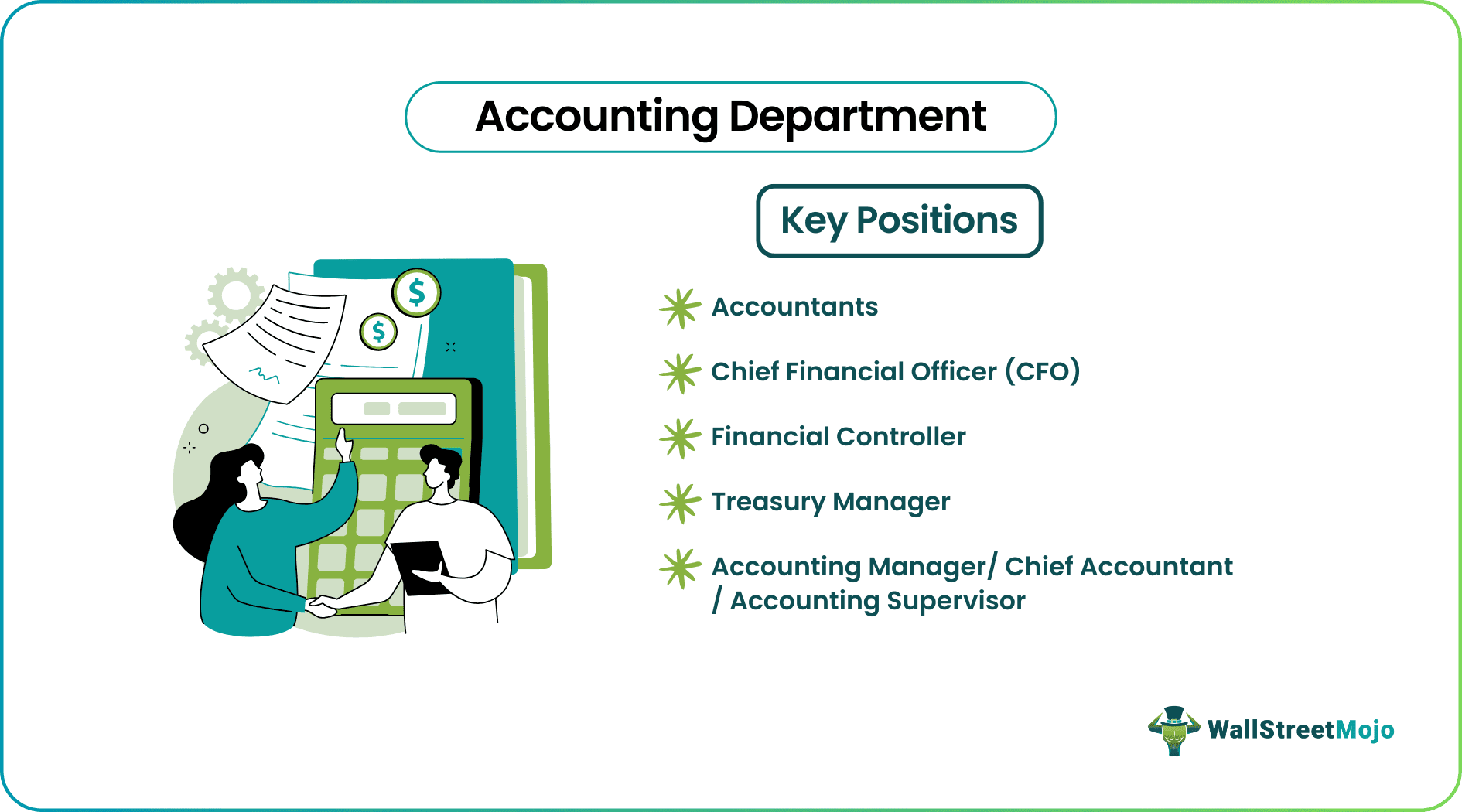Table of Contents
Accounting Department Definition
The Accounting Department refers to the division in a firm that looks after the preparation of financial statements, maintenance of general ledger, payment of bills, preparation of customer bills, payroll, and more. In other words, it is responsible for managing the overall economic front of the business. It is impossible for any business, be it a small firm operating from home or a large multinational company, to function for too long without an accounting department.
Functions of the Accounting Department
- To maintain and record all business transactions accurately and comprehensively in a systematic way so that they can be retrieved and reviewed at any time.
- To maintain adequate internal controls within the organization to safeguard its valuable resources.
- To provide a basis for performance assessment and create accountability across the organization.
- To keep track of costs incurred by the company and advise the modification of existing operations to reduce operating costs.
- To support senior management in the decision-making process by appropriately presenting the financial data.
- To plan based on anticipation of business needs and expected availability of resources.
Roles & Responsibilities
- Collecting all the financial data and preparing the financial statements reports properly. These reports are used to prepare budgets, forecasts, and other decision-making reports and help communicate the company's financial details to lenders, investors, and other stakeholders.
- Maintaining a healthy relationship with the vendors by ensuring that they get paid on time. However, accounting professionals must suggest ways to introduce opportunities to save money by offering discounts/incentives whenever vendors make timely or advance payments.
- Tracking account receivables and outstanding invoices and advising if any collection actions are required. The accounting department should ensure that the customers pay the invoices on time and thereby maintain a cordial/friendly relationship with them.
- Taking care of the payroll function. They have to ensure that all employees get paid accurately and timely. Additionally, the department should also ensure that employee taxes are assessed accurately, and the payments are made timely to the state and federal authorities.
- Maintaining financial controls via reconciliations and adherence to the applicable standards of accounting, such as US Generally Accepted Accounting Principles (GAAP). All of these practices are implemented to prevent any fraud and theft. As a finance controller, the department should ensure proper maintenance of the procedures.
Accounting Department Structure
Most companies have more than one staff member in their accounting department, and hence, they have to set an organizational structure to streamline their functions. In general, it comprises Chief Financial Officer (CFO), Financial Controller, Managers, and Accountants. The structure is as follows:
- The CFO is at the top of the department and reports directly to the owner of the business or the Chief Executive Officer (CEO).
- The Financial Controller reports to the CFO and has more specific responsibilities within the department.
- The Financial Controller generally has a team of Managers – Payroll Manager, Accounts Receivable Manager, and Accounts Payable Manager.
- Each division manager usually has a team of Accountants
Value of Accounting Department
The accounting department plays a vital role in running a business. It helps track revenue (money in) and expenses (money out) while ensuring compliance with all statutory requirements. It also provides quantitative financial information to management, lenders, investors, and other stakeholders, who use it to make informed business decisions.
Key Positions of the Accounting Department
The following are some of the key positions:

- Chief Financial Officer (CFO): The CFOs are usually at the top of the finance department of large corporations. They are responsible for overseeing the business's financial health and managing the overall finance department, which includes financial planning & reporting, short & long-term business strategy, auditing, internal risk management, etc. They also help senior management understand the financial implications of various ongoing activities – within and outside the organization.
- Financial Controller: The Financial Controllers work alongside the CXOs, and they are responsible for financial accounting and the preparation of reports on project management, budget, and more. However, their major focus is on managing immediate financial issues.
- Treasury Manager: The Treasury Managers help in the formulation and development of various treasury policies, which include identification of best investment opportunities, optimized usage of credit facilities, reduction of financing costs, etc.
- Accounting Manager/ Chief Accountant/ Accounting Supervisor: These managers are responsible for maintaining and reporting all the financial transactions. They also establish and enforce the accounting principles based on the auditing policy and statutory requirements.
- Accountants: Accountants play a vital role in an accounting department as they are involved in measuring and interpreting all the financial information.
- Chief Financial Officer (CFO): The CFOs are usually at the top of the finance department of large corporates. They are responsible for overseeing the financial health of the business and managing the overall finance department, which includes financial planning & reporting, short & long-term business strategy, auditing, internal risk management, etc. They also help senior management understand the financial implications of various ongoing activities - within and outside the organization.
- Financial Controller: The Financial Controllers work alongside the CXOs, and they are responsible for financial accounting as well as the preparation of reports on project management, budget, and more. However, their major focus is on managing immediate financial issues.
- Treasury Manager: The Treasury Managers help in the formulation and development of various treasury policies, which include identification of best investment opportunities, optimized usage of credit facilities, reduction of financing costs, etc.
- Accounting Manager/ Chief Accountant/ Accounting Supervisor: These managers are responsible for maintaining and reporting all the financial transactions. They also establish and enforce the accounting principles based on the auditing policy and statutory requirements.
- Accountant: The Accountants play a vital role in an accounting department as they are involved in the measurement and interpretation of all the financial information.

